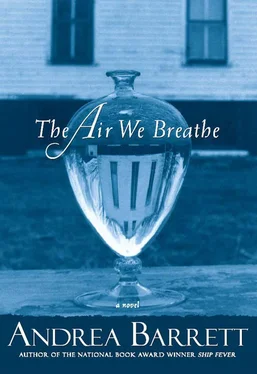Clean rags, cold water, boiling water, disinfectant. She was good at this, she knew; she had just the right touch, swift and light but exceedingly careful. Never spreading the tainted blood past the site of the spill, never flicking it onto herself, never letting water drip from the used rags onto anything else. Each rag quickly sealed in the covered bin and then, after the linen on both beds was changed, the floor mopped, and the furniture wiped, the bin whisked away for the rags to be burned. She could turn out a room in an hour.
Six o’clock came and went as she worked, and she missed her chance to hear the rest of Miles’s story. But at least, as she found when she put on her coat and went outside, Naomi had waited for her.
“Do you want a ride home?” Naomi asked. She looked over her shoulder at Miles, bundled into the back seat in a heavy wool jacket. “I mean, if you don’t mind…”
“It would be my pleasure,” Miles said. “Your friends are mine.”
“That would be wonderful,” Eudora said. “Snow’s coming, I think. And it’s been a long day. I enjoyed your talk — what I heard of it, anyway.”
She and Naomi tied her bicycle onto the back of Mrs. Martin’s Model T and then cranked the engine. Just as it was turning over, Miles asked if they needed help.
“Thank you,” Naomi said patiently, “but we’re fine — I do it myself, all the time. Eudora’s only helping because she wants to learn to drive on her own.”
Eudora sat beside Naomi, up front, so she could watch the dials and gauges. The wind blew, the clouds chased each other across the moon, and the car flew between the trees and then around the enormous curve that, from our perch on the porches, obscured for a long stretch anyone arriving or departing. While Miles watched the clouds, Naomi tried, for the third or fourth time, to explain to Eudora how to set the spark and the throttle levers.
“Start over,” Eudora said. Why did she find this so hard to remember? Otherwise she was very good with machinery.
“Look,” Naomi said, tapping the levers on the steering wheel as they came to a rise. “If you’re in high gear when you get to a hill, push the spark lever back till it’s at the second or third notch, and open the gas to seven or eight notches. As soon as you hear the engine start to labor, use the clutch to put it in low gear and then move the levers like this. It’s simple.”
“I’ll remember this time,” Eudora said, even as she felt the details slipping away. In the headlights, which brightened as they picked up speed, soft fat clumps of snow began to rush at the windshield. She turned her head toward the back and said to Miles, “I missed the end of your story. Would you mind telling me more about that dinosaur?”
Eagerly he leaned forward and, as Naomi shifted gears and told Eudora to listen as the sound of the engine changed, repeated what he’d told us. Naomi steered along the edge of the lake, where some geese who should have headed south earlier were huddled by the benches in the park, and then drove into the village, past the lights and the people walking through the wet flakes. Miles completed his story and then said, shyly, that he thought the afternoon had gone well.
Eudora agreed. They passed two doctors who worked at the private sanatorium up by the tobogganing hill; three boarders from Mrs. Martin’s house, standing in front of the theater; the mayor, walking his dachshund; one of the druggists talking with the director of the second-best funeral parlor. The dachshund, Eudora saw in the light pouring out from the theater, trotted along on his dwarfed legs as if he were exactly as important as the mayor.
They passed the village train station, so much more welcoming than the siding at Tamarack State, and then pulled up at Eudora’s house. Inside, she knew, her parents would be sitting at the table, waiting dinner for her, listening to the empty rooms. If she was lucky, Eugene might have come over from the garage, in search of a home-cooked meal. If not, she’d be on her own, caught in her parents’ silence. What did they do all day, now that she was working at the sanatorium and everyone else was gone?
“That was a treat,” she said to Naomi, opening the car door. “Thank you.”
As she was about to walk back and untie her bicycle, Miles cleared his throat and said through the open door, “I wonder if you — I mean this for both of you — I know you’re both busy but you did seem interested in what we were talking about…Would you like to join in our sessions? Officially, I mean, not just listening on the side like you’ve been doing.”
Naomi hesitated just as Eudora said, “I’d be delighted.”
MILES WAS DELIGHTED that they’d said yes. Later that week, tucked into his bed at Mrs. Martin’s house, he wrote to Edward Hazelius:
I hope this finds you well. I am doing well myself, very comfortable in my fine room. Just now I am in my excellent bed, the windows open and the alpaca shawl you so thoughtfully sent on my shoulders. The electric lamp shines down on my tray, which neatly holds my pen and papers; the covers are snugged over my legs; what more could I want?
Well, my health, of course. And to be back in my own house and, if not back at work, at least planning travels with you and Lawrence. Our last trip has been very present to me these weeks, as I go through my journals from that summer and talk to strangers about our work. The experiment I described to you continues — our group had its third meeting this week — and although I meant to speak only at the first meeting, and only as an example to the others, I’ve found myself surprisingly caught up in the pleasure of sharing what I know. Also I’ve been stimulated by the realization of how very little the Tamarack State inmates know about the world around them. In education (or lack thereof), background, and training they are not dissimilar to the hands at your plant or mine.
Because of this I’m often forced to backtrack, defining terms as I describe aspects of where we went or what we found; even the simplest principles of sedimentary deposition are beyond them. But this week I made real progress, I think. There is one inmate who seems particularly alert and whose face I use as a sort of living barometer; when I have his attention, I know I’m speaking well. This week he asked me about Kovalevsky! That a man in his position should know that name…
Sorry — that blot marks the entrance of my very vigorous landlady, Mrs. Martin, come round with our evening glasses of hot milk and some fresh gingerbread. A crisply starched apron; her hair perfectly coiffed and a smile on her face — you could not find a better housekeeper, and there are reasons this is the most expensive cure cottage in the village. As always we get what we pay for. Her daughter, who helps her out, has offered to drive me weekly to the sanatorium.
I see, speaking of getting sidetracked, that I have once more succumbed. This happens to me so commonly now that I wonder if my daily fevers have not impaired my mental functions. Though more likely it is the result of spending so much time in bed, so lazily: I hate this. The inmates at Tamarack State must hate it as well but their opportunities for self-improvement, unlike mine, are minimal. Their so-called library is shocking, ill-sorted shelves of castoffs donated by the villagers: old encyclopedias, new inspirational tracts, dime-store romances, gardening manuals, anthologies of sentimental verse, memoirs of unknown military figures, outdated almanacs. I could weep when I think of the orderly reading rooms we established in our plants. If our public library can deliver good and useful books on a weekly basis and encourage a program of systematic reading among the workers, why can’t that be done here? And if, in our well-run cafeterias, up-to-date magazines are available for the workers’ perusal, why must these inmates rely on tattered copies of Yiddish-and Russian-and German-language newspapers brought up weeks or months later by visitors from New York? Why isn’t there a daily English class? (The speech of many is far from perfect.) Or any of the other amenities we introduced in our plants?
Читать дальше












